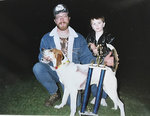
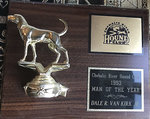
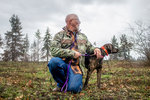
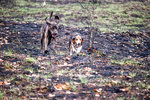
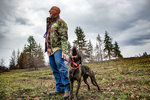
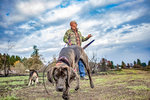
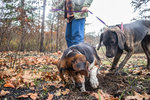
Dale Van Kirk Jr. used to spend his free time fighting to preserve the rights of his fellow hunters who prefer the company of hound dogs during their backwoods pursuits. These days, he finds himself defending himself against threats from a hound hunting community that he says has become nearly unrecognizable in the two decades since Initiative 665 outlawed the use of hound dogs for hunting big game such as bears, cougars, bobcats and coyotes in Washington.
Van Kirk, 57, of Centralia, served as the president of the now defunct Chehalis River Hound Club from 1991 to 1993 and acted as the club’s legislative liaison for six years. Back then, hunting big game with hound dogs was regulated but legal in Washington. At one point, there were 13 hound-hunting clubs in Washington. About 22 years after that old pastime was outlawed, there are just two organizations remaining — The Olympic Tree Hound Association and the Washington State Hound Council.
Although he rarely hunts these days, Van Kirk was a member of the Washington State Hound Council up until recently. He explained that he let his membership lapse following revelations in The Chronicle regarding an ongoing poaching investigation in Southwest Washington and northwest Oregon that alleges hound dogs were used extensively by a ring of prolific poachers as they illegally killed hundreds of animals large and small on both sides of the Columbia River.
Although he found the acts of poaching to be reprehensible, Van Kirk says that alone was not the reason he dropped out of the Washington Hound Council.
Instead, he says he was turned off by the response, or lack thereof, from assorted hound dog associations and their members. Van Kirk says many members went online and expressed an indifference to the crimes, stating that the only difference between the accused and themselves was that that suspects had been caught.
Van Kirk says other association members refused to believe the validity of the accusations despite the mountain of evidence presented by the Washington Department of Fish and Wildlife. Most of all, Van Kirk noted with disappointment the complete absence of comments from the leaders of the Washington Hound Council.
“I don’t have a desire or need to belong to something that bad that I’m going to belong to something like that,” explained Van Kirk.
Back when hound hunting was a more commonly accepted and generally legal practice, Van Kirk worked hard in an effort to preserve the rights and good reputations of his fellow hunters, taking their case all the way to the state Legislature as well as various wildlife commissions. Ultimately, hound hunters lost the fight to the balance of public opinion, and hound hunting for big game was largely banned in Washington.
“Yes, we lost our right to hunt, but that’s no reason to go skirting the laws,” said Van Kirk. “I just let my dogs die out after that because they were like family to me.”
According to Van Kirk, many other like-minded hound hunters in Washington responded similarly, causing participation numbers to plummet. Van Kirk explained that as numbers dropped, the Chehalis River Hound Club eventually morphed into the Washington State Hound Hunters Association, but even that group disbanded about five years ago. Although the Olympic Tree Hound Association and Washington State Hound Council are still around, Van Kirk says those organizations largely fail to represent the interests of hound hunters to the Legislature, wildlife officials and the general public. Instead, Van Kirk says, those organizations have become increasingly insulated from the pulse of public opinion.
Van Kirk says something else strange happened after the ban on hunting bear and big cats took effect. He says a younger, more reckless, generation took over in the stead of the hound hunters who were legislated out of the woods. That new wave of hound hunters seems to be more bloodthirsty and more or less unconcerned with the legality, or morality, of their actions. He said it has established an outlaw culture he compares to the moonshiners of Appalachia.
“It’s weird. You’ve got this stereotypical us-against-them culture that started with the moonshining culture back east and somehow it seems like it’s made its way out here,” said Van Kirk. “With the age of some of those I’ve seen driving around with dog boxes in their trucks, and given the fact their names don’t ring a bell, I don’t see these people as sons of those legal hunters I knew before the ban. I don’t view them as the next generation of hound hunters. I view them as a blight on how others view hunting.”
Van Kirk even told of an encounter he had in recent years at a big box store in Chehalis while purchasing a hunting license.
“The cashier said, ‘I’m surprised you took the time to do this. Most people in Lewis County don’t even bother to buy a hunting license,’” he said.
On top of that cultural shift toward more aggressive, and inherently illegal, hunting, Van Kirk insists that there are more people hunting bears and big cats in Washington with the aid of dogs these days then there were when it was legal.
“It’s ironic that since the ban I see more dog boxes in the back of trucks than I did before,” said Van Kirk.
Mike Cenci, deputy chief of westside enforcement operations for the WDFW, seems to agree with Van Kirk’s observations of a perceived uptick in apparent illicit hunting activity in Washington’s backwoods since the ban on hunting big game with dogs back in 1996.
“One of the things we are seeing is an increase in, for whatever reason, people going out and whacking animals and leaving the carcass in the field. What the hell? In my mind, and I’ve got a small brain, but to me that person just wanted to kill something. No respect for the law for sure but even worse, no respect for the animal,” Cenci told The Chronicle earlier this year after the investigation into the poaching ring based out of Cowlitz County was announced.
Cenci explained that there are two factors that make catching poachers difficult. First is the sheer size of the area that WDFW officers are tasked with enforcing and the other is a lack of staffing to send to the remote areas where poaching is often conducted.
“You can walk around in the woods all day long with a gun. That’s not illegal no matter the season,” noted Cenci, who added that a truck full of dogs out in the woods does not constitute illegal behavior either. He noted that he he has only witnessed a handful of animals taken illegally in his career, so luck and timing are important factors.
“If I contact that person too soon they might just say their dog was getting some air. If he tells me to pound sand and doesn’t admit to anything and just tells me he was taking his dogs for some exercise, there is no ban on taking dogs into the woods. It’s just on using them on specific animals.”
Van Kirk says that by legislating legal hound hunters with a strong moral compass like himself and other formerly active hound association members out of the woods, the state effectively compounded their chronic understaffing problem and the associated lack of official vigilance in the backwoods. First, Van Kirk argued, the WDFW’s coffers dwindled when those jilted hound hunters quit purchasing hunting licenses and tags. Secondly, Van Kirk says that back when hound hunting for bear and big cats was legal in Washington, there was a larger, more dependable network of upstanding citizens helping to fill in the gaps where the eyes of law enforcement struggle to see.
“Back then, we were all fighting to keep our privileges. Now, I don’t think people care because it’s a done deal,” reasoned Van Kirk. “Plus I think it’s a new culture. Once you see how active these guys were in such a large area, in my mind you can’t be that active in such a large area without running into other hunters, who in the past, would have made no bones about turning you in. And now they don’t.”
Van Kirk doesn’t know if those violations went unreported because people didn’t know what they were observing, they simply chose to turn a blind eye, or if it’s because witnesses were also involved in illegal activities. In any case, “You have to wonder why this wasn’t turned in earlier,” said Van Kirk.
Cenci agrees with that sentiment.
“I think far more of this is happening than we’ve been aware of, but you don’t know if you don’t go. Again, there’s a lot of landscape out there and you know these guys obviously have killed a lot of animals right underneath our noses,” Cenci told The Chronicle.
Since hound hunting was largely outlawed in Washington, Van Kirk has taken up an interest in issues related to the sport in other parts of the country. One of the most recent cases of poaching to catch Van Kirk’s eye occurred in North Carolina where the president of the American Plott Association and the Vice President of the National Plott Association were accused of illegally killing a bear within the Wayah Sanctuary.
When Van Kirk posted a copy of the story to his Facebook account, he was met a barrage of uncouth commentary from other users that included death threats. Van Kirk said he’s used to being the target of insults and threats, but its not usually friendly fire from other hunters and hound owners. Back in the 1990s, he used to set up a table to champion the cause of hound dogs at the downtown Olympia Farmers Market, which he calls the epicenter of liberalism. He certainly heard dissenting opinions on those occasions, and another time he says he was accosted at a WDFW public meeting. “I’ve been spit on and slapped for being a hound hunter,” said Van Kirk.
Van Dyke says in the past he has also drawn the ire of poachers by working in conjunction with law enforcement to take down a network of cougar poachers in Pierce County. He says a more moderate set of hound hunting regulations would help to reduce the amount of poaching that happens in Washington by giving legal hunters another reason to be in the woods.
Van Kirk doesn’t believe that additional and more restrictive laws are likely to make an impact on the problem.
“These people, obviously they don’t care, so game laws and bag limits obviously mean nothing to them,” explained Van Kirk. In his eyes, the best case scenario would be the reintroduction of limited general hunting seasons for hound hunters to employ their dogs.
“Just the opportunity for regular ol’ Joe Sixpack could be able to put in to hunt bear or cougar. Just the ability to go out and hunt the animals that we used to,” said Van Kirk. “That way they are still stakeholders in it and they don’t want to lose it. Since we can’t even hunt here,nobody really cares and they just kind of look the other way.”
Still, Van Kirk knows that is unlikely to happen any time soon.
“It would be nice for it to go back the way it was, but with these idiots out there doing what they are doing now, the public is always going to have their say at the end of the day and this doesn’t make it look too good.”
Van Kirk says he would like to see the state incentivize citizens to help keep an eye on the woods much like Idaho does with their Citizens Against Poaching program, which provides rewards to people who provide tips about poaching and other illegal activities. After all, although poaching is currently in the news, he and the WDFW know that there are still poachers operating around the region.
“I hate to say it, but I think it is the biggest case I’ve heard heard of. It is a big coup for them, but I’m afraid it might be the tip of the iceberg,” said Van Kirk.
Although he let his old pack of hunting hounds die out after the passage of I-665, Van Kirk was unable to stay away from the dogs for long. Today, he owns one beagle and three plott hounds, one of which took home the award for Best of Opposite Sex at the Westminster Kennel Club Dog Show this year. All told, Van Kirk says he has about 30 years experience raising and judging dogs in American Kennel Club trials. He said he first got started with beagles and then moved on to bigger hounds.
“I remember when I was a kid I always grew up around people who had beagles and bigger hounds,” said Van Kirk, who was a big fan of “Old Yeller” and “Where the Red Fern Grows” as a youth. “I just always thought there was something neat about being out there with a dog … You take pride in it.”
Van Kirk says once he retires he plans to move to a place with more lax hound hunting regulations and a better hunting culture in general. Until then, he makes sure to get his dogs out for a good, non-lethal run, at least once a week.
“It just kind of keeps me in touch with yesteryear. To me, and a lot of other people, it has nothing to do with killing the animals. I mean, if it’s scrambling up a tree it’s not really being harassed or tortured,” explained Van Kirk, who used to hunt along the Chehalis River near James Road in Rochester and in the Capitol Forest, among other places.
“It’s more just for the gratification of getting them up the tree. If I owned a border collie I’d probably have sheep or something for it to chase.”
Multiple emails from The Chronicle to the Washington State Hound Council over a matter of several months failed to generate any meaningful response from the organization, although on at least two occasions an official written response was promised. Although disappointed, Van Kirk says he is not at all surprised by the lack of response from Washington’s largest hunting hound organization.
“Back in the day most of us had no problem turning somebody in, especially when it came to reporting a person to the authorities. The thing is, we were fighting for our rights back then,” said Van Kirk.
Asked if, in the absence of what he would consider adequate leadership, he would ever consider taking up the torch for the hunting rights of Washington hound hunters in the future, Van Kirk issued a curt rebuke.
“I wouldn’t lead a bunch of people who don’t have the stones to stand up for what’s right,” said Van Kirk.